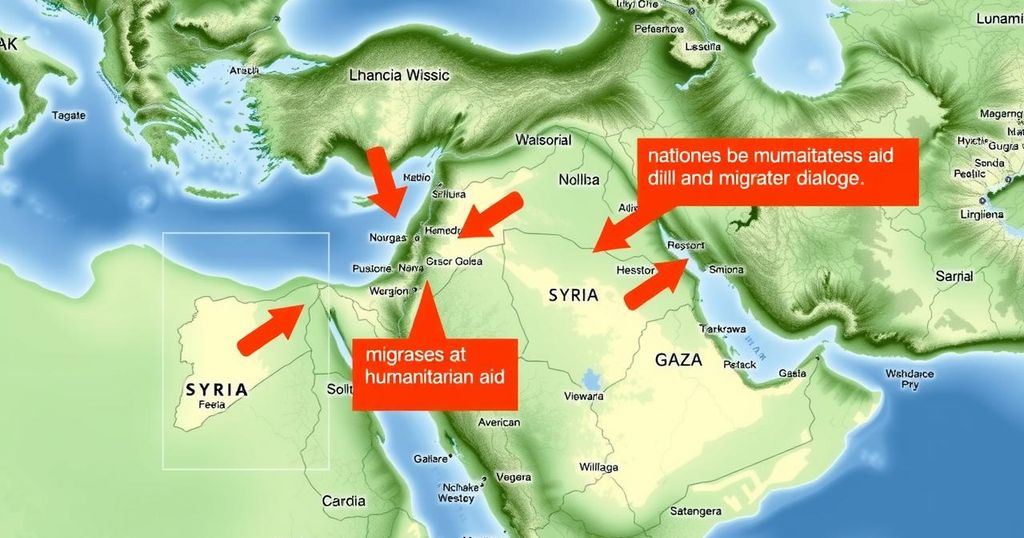Rubio Addresses Gaza, Iran Nuclear Talks, and Syria’s Fragile State

U.S. Secretary of State Marco Rubio addressed the Senate about Gaza, Iran, and Syria. He clarified there are no plans for Gazan deportations to Libya, emphasized resuming food aid to Gaza amid ongoing challenges, and warned of potential Syrian government collapse. The testimony highlights the complexity of U.S. foreign relations and the necessity for cautious engagement in the region.
U.S. Secretary of State Marco Rubio addressed the Senate Foreign Relations Committee on Tuesday, focusing on a range of pressing issues including the situation in Gaza, potential nuclear negotiations with Iran, and the complicated status of sanctions against Syria. Rubio emphasized that there have been no discussions regarding the deportation of Gazans to Libya, clarifying that the U.S. has instead inquired with other nations about the possibility of voluntarily accepting Gazans who wish to leave the region temporarily for various reasons.
Specifically, Rubio noted, “What we have talked to some nations about is if someone voluntarily and willingly says I want to go somewhere else for some period of time… are there countries in the region willing to accept them for some period of time?” It’s important to emphasize that, as of now, Libya has not been part of these discussions. Additionally, he expressed cautious optimism about the resumption of food shipments into Gaza. He indicated that about one hundred trucks were lined up ready for entry, although he acknowledged the distribution of humanitarian aid has yet to commence.
Meanwhile, United Nations spokesperson Stephane Dujarric reported that a team assigned to collect food supplies faced delays waiting for Israeli clearance to access the Kerem Shalom area. He stated, “Unfortunately, they were not able to bring those supplies into our warehouse,” highlighting the ongoing challenges faced in delivering aid effectively to those in need.
On another front, Rubio discussed the administration’s efforts to negotiate a nuclear deal with Iran. He asserted that reaching an agreement would be complex but noted the administration’s position aimed to offer an “off-ramp” for Iran, allowing them to explore peaceful nuclear energy while refraining from uranium enrichment. Rubio remarked, “It will not be easy, but that’s the process we’re engaged in now.”
Turning to Syria, he conveyed concern about the precarious state of the new Syrian government following President Trump’s recent engagement with President Ahmed al-Sharaa. Rubio warned that without intervention, the Syrian transitional authority could face imminent collapse, potentially leading to widespread civil unrest, declaring, “It is our assessment that… the transitional authority… is maybe weeks, not many months, away from potential collapse.”
Rubio also pointed out some positive signs of unity among various communities in Syria, stating, “diverse groups in Syria feel a sense of Syrian identity, including Sunni and Shia, as well as Christians, Druze, Alawites, and Kurds.” He stressed the importance of cultural cohesion, which has been eroded under the Assad regime.
There were discussions about Sharaa himself, whose background raises concerns due to past associations with al-Qaeda. Rubio remarked that determining whether Sharaa can be trusted is critical. He observed, “These new figures running Syria would not pass a background check with the FBI,” underlining the difficult choices the administration faces.
While several media outlets reported Rubio’s comments, framing the potential for civil war as urgent, it seems that context was somewhat overlooked. Rubio was advocating for cooperation with Syria’s new regime, aligning with the current official policy. President Trump’s unorthodox approach, favoring personal diplomacy over traditional channels, seems to influence potential relations.
In the midst of all this, it should be noted that there exists strong resistance to the idea of easing sanctions in Washington. “Sanctions are like an oil tanker; they cannot shift course quickly,” Rubio remarked, highlighting the bureaucratic challenges that may slow down any changes despite the EU’s recent move towards relief. As Rubio detailed, Sharaa faces considerable domestic hurdles, from dealing with armed insurgents to securing control over smuggling networks.
Ultimately, the situation in Syria remains incredibly complicated. The new government is attempting to gain stability while facing opposition. Addressing the prospects of cooperation with foreign nations while remaining cautious of internal turmoil is crucial as developments unfold. As Rubio indicated, neglecting diplomatic engagement could lead to destabilization in Syria, potentially pushing it towards alliances with anti-Western entities instead.
In summary, Secretary of State Marco Rubio’s recent testimony outlines the complex geopolitical landscape regarding Gaza, Iran, and Syria. While he clarified U.S. positions on deportations and expressed cautious optimism about humanitarian aid reaching Gaza, he also warned of Syria’s delicate state. The U.S. administration faces significant challenges in navigating these issues, particularly with regard to sanctions. Engaging with new Syrian leadership and fostering regional cooperation could be pivotal for stability. However, Rubio’s insights reveal that the road ahead is fraught with difficulties and resistance in Washington, indicating that careful strategy will be needed moving forward.
Original Source: www.jpost.com







